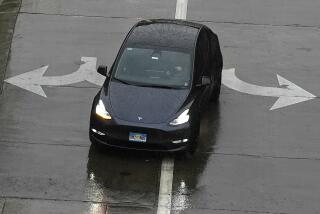Electric Cars Run Into Static Over Smog
Smog is bad. Gasoline-fueled cars contribute to smog.
Therefore, replacing them with electric cars will reduce smog.
Not necessarily so, says a team of researchers whose study on air quality and electric vehicles appeared last week in a journal published by the American Chemical Society.
The study, partly funded by automobile and oil companies, made use of a photochemical modeling technique to look forward to 2003 when at least 10% of new cars sold in California--under a state law now in effect--must be zero emissions vehicles, called ZEVs. To date, only electric cars qualify as zero emissions vehicles.
The researchers, from Carnegie Mellon University in Pittsburgh and Georgia Institute of Technology in Atlanta, wanted to determine how much the electric cars would effect smog levels then.
Their answer: Too little to notice.
“What we concluded was that there would be a calculable, but probably unmeasurable change,” said Francis McMichael, a Carnegie Mellon engineer and one of four authors of the study.
The change in the amount of ozone in the Los Angeles atmosphere would be less, he said, than one part per billion.
“Rounding off, that would be a total of 199 ppb, down from 200,” McMichael said. “That’s a long way from the target of 120.”
The report has already roused controversy.
“Their analysis is meaningless,” said Roland Hwang, a senior analyst with the Union of Concerned Scientists, a San Francisco-based lobbying group known for its pro-environmental and anti-nuclear stands.
“They looked at one piece of the total air quality attainment plan, and said it would not have much impact on ozone levels,” Hwang said. “But you could look at any single piece of the plan and say that. Every piece contributes just a little.
“When you put them all together, then you see the real results--cleaner, healthier air.”
McMichael said his study was not intended to examine the plan in its entirety. Still, he questioned the electric car component of the California plan.
“It’s a very high price for an incremental benefit,” he said.
A spokesman for the California Air Resources Board, which oversees anti-pollution policies in the state, said the report revealed nothing new.
“This argument has been made before,” said Jerry Martin. “It is based on the very narrow assumption that 10% of the new cars is all the electric vehicles that will ever be. Most of us believe the number of vehicles will increase over time and their impact will increase.”
A key contention of the study is that electric cars would have little impact on smog because new gas-fueled cars are equipped with highly efficient emission control devices.
“The new cars are so much cleaner than in the past,” said McMichael, “and the ones in the future will be even better. Replacing these new cars with ZEVs doesn’t give you nearly the results as replacing the older, dirtier cars.”
Hwang said the gasoline cars don’t maintain a high level of efficiency. “They are saying that the new cars are 95% to 98% cleaner than when they were unregulated,” Hwang said. “But that is absolutely false. What they are ignoring is deterioration of the vehicle, malfunctioning of the system, evaporative emissions, refueling emissions-- 75% is more realistic.”
“Even the cleanest internal combustion vehicle will one day be a dirty vehicle,” Martin said. “That is not true of electric vehicles. They will be forever zero emitting.”
McMichael is no stranger to controversy in this field. Last year, he and two co-authors of the current report published a paper that examined the consequences of producing the lead acid batteries needed to power electric vehicles. It concluded that an “electric car is estimated to release 60 times more lead per kilometer of use relative to a comparable car burning leaded gasoline.”
Critics said the researchers used old data in coming to their conclusions and did not take into account advances in technology. California officials noted that because of tight controls on lead processing in the state, smelting emissions were far less than those stated in the report.
But McMichael sticks by the conclusions of that report, saying that critics have no concrete evidence to refute the findings.
But he acknowledged criticism that the research by him and his collaborators was partly funded by auto and oil companies, which have long opposed electric car quotas.







